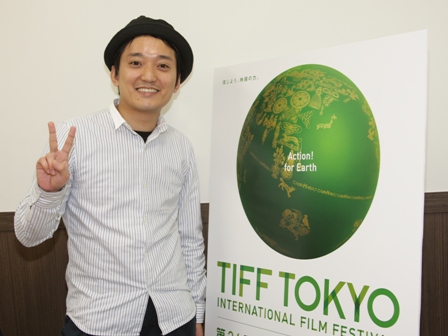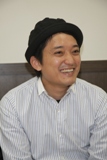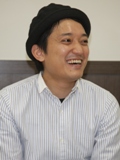Official Interview Japanese Eyes:PFF Grand-Prix winnig film screening “Damn Life”
Interview with Hitoshi Kitagawa (Director)

“Damn Life” won the Grand Prize at the PIA Film Festival this year, a prestigious honor and approval for new talent in the world of Japanese cinema. Hitoshi Kitagawa’s first feature takes an extreme situation, looking at it with dark incisive humor and great visual style.
— I see that you’ve studied literature and were involved in theater.
Hitoshi Kitagawa: I studied art history, under the department of literature. And philosophy.
— Did you study filmmaking, formally?
Kitagawa: I didn’t actually, especially study film production, but I was in drama club when I was at the university. As a member of the drama club I was in films that my classmates made at that time. But after that I went to graduate school and studied filmmaking there. But I’ve never really officially studied any film production. It was more about the philosophy and research. It was more on that side.
— I noticed [from the Busan Film Festival catalog] that you directed videos for the Tokuo Theatre Company.
Kitagawa: So Tokuo is actually a theatrical group and it was in one of their performances they showed some video that I was actually involved in filming and editing. And they also have a DVD of that. So it’s actually a short film, but it was for that company.
— So just one?
Kitagawa: In terms of being involved in editing other people’s films I’ve probably been involved in more than a hundred, but in terms of directing a writing scripts this is the first.
— “Damn Life” has a very theatrical feel to it. Did this work in working in theatre influence your ideas for making films?
Kitagawa: You may be correct when you say a theatrical feel to it, because I was also involved in directing the film that was shown in that theatrical performance. I also acted in it. So, I have that experience and also when you’re looking at a theatrical play, it’s like they’re performing in a box. Camera angles don’t change at all. So watching theatrical performances from the audience point of view, I got many hints in terms of filmmaking from there as well, and also in directing actors, as well as my own experience of acting. So maybe that’s what you felt seeing “Damn Life.”

— Can you tell me about Keita Kasatsugu, the actor who plays the lead role, Kotani. Is he someone you worked with theatre before?
Kitagawa: He was a couple of grades younger than me in college and we were in the same drama club.
— And some of the other actors?
Kitagawa: So this year, as you know, I was given an award at the PIA Film Festival for this film. But last year I submitted a different film. Some of the people who came to see film asked me if they could appear in my next film and they automatically we cast in it.
— “Post Girl” was last year’s film. This year you made “Damn Life.” “Post Girl” deals with a suicide and a person’s reaction. “Damn Life” deals with a drowning and the main character’s reaction. Both deal with traumas. This seems to be a theme that you’re exploring. Could you tell me a little about your ideas about traumas and how they affect people.
Kitagawa: For “Post Girl,” at that time I was very interested in revenge. I thought revenge was a very clear objective in terms of making my film. The traumatic event was just for me to justify the revenge. So that was the purpose. It was more revenge than focusing on traumatic events. I myself am not very tall. I went to an all-boys’ school for junior high and high school. I wouldn’t say I had traumatic events, but I had quite a lot of regrets from my past. And so, with that in mind, I thought of revenge. Many people have regrets of their past, so I thought looking at someone’s life from that angle would also be interesting.
— You take this idea of a man who had a trauma and now does everything he’s told. He’s humiliated. He’s bullied and turns to violence. Is this kind of a purging of your own feelings?
Kitagawa: My experiences weren’t that bad. I had seen a lot of people going through that kind of experience. And in terms of making films, if it’s small bullying, it’s not interesting on film – if you make it into a story. So I thought if this is going to be a part of what’s taking place in this person’s life that it really should come out more strongly. That was the purpose in terms of making it into a film to have the audience really understand what was going on rather than something very subtle.
— Did you go to Pusan to see your film?
Kitagawa: Yes.
— Have you seen the film with Japanese audiences?
Kitagawa: Yes.
— Have you seen different reactions from the way Korean to the way Japanese audiences react to your film?
Kitagawa: This is my impression. I thought it was totally different. The Korean audience was very honest with their feelings. They were open with what they thought. Their emotions were very clear compared to the Japanese audience. In the last scene where the neck is slashed and there’s all the blood, the Japanese audience laughed. I thought that would be a laughing point. The Korean audience thought it was very gruesome. They were a little scared about that scene, so the reaction was quite different. Maybe the Japanese audience has a cynical look. Maybe like – What are you going to make? What are we going to be looking at? Whereas maybe the Korean audience was more honest. They accepted what they saw. So maybe that is the main difference between the Japanese and the Koreans.
— As an American, I had a more Korean type reaction. Bullying, humiliation is all over the world, but different cultures react differently.
Kitagawa: So, maybe Japanese audiences really know that this is fictional. This is just a story. And so that’s how they’re looking at it. Whereas the Korean audience maybe felt that they were in the scene with him and experiencing the same thing. So maybe that’s why their emotions came out differently.
— Apart from a psychological portrait and a philosophical investigation of how far violence and bullying takes people, did you think of making this film as a social commentary on life in Japan?
Kitagawa: In Japan they use the word “KY” which means “kuuki wo yomu.” Meaning “one’s expected to get the vibe from people.” That’s a word that used often in Japan. So in that sense you have to be aware of what’s really going on and sort of agree to what’s going on, rather than saying something different. They think in that way that you’re really understanding the vibe around you. So, therefore, I’m saying that if you took that to the extreme that maybe people, in terms of the character Kotani, could turn out to be like that. I wanted to investigate it from that angle.

— You’re the director, cinematographer, editor, everything. The visual style of the film is completely different and interesting compared to many films I’ve seen. Could you tell me about your film, art historical, photographic influences?
Kitagawa: In terms of film directors, I love the films of Kiyoshi Kurosawa and Takeshi Kitano and it could be that there is some influence from those two directors. In terms of cinematography, I’m became one because there was no one else to fill that role. I would prefer if there was someone who was more of a professional cinematographer there, then what you would see visually would have been quite different. I would have liked to explore that as well, but unfortunately right now, I’m the only person available to do it and it’s what you see right now. And in terms of art history, I was interested in impressionism, but I don’t know if that has a direct influence or not. I’m 29 right now and I still read manga and so maybe that has a stronger influence on what I create.
Interviewed by Nicholas Vroman (Film writer)
Damn Life












